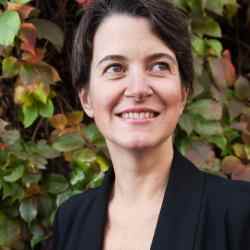Is Your Company "Life Ready?" Riccarda Zezza's Innovation Views Work And Life Together

[This article originally appeared in Forbes]
Meet Riccarda Zezza, the founder of “Maternity As A Masters,” a digital training program that turns early parenthood into a “masters degree” in skills like empathy and time management. Starting in Italy and now reaching participants in 23 countries, MAAM works with businesses to show that the learning that comes with new life experiences can fuel professional growth. Ashoka’s Sonia Park caught up with Riccarda to learn more.
Q: How did you come up with this concept?
A: I had been working in big companies for 15 years when I had my first child. I felt as if my employers saw having a child as a problem for work. After being demoted when I returned to work after having my second child, I decided to switch gears and find different solutions to this everlasting challenge. With MAAM, I set out to change the mental association of maternity as an illness or a problem to Maternity As A Masters.
Q: How does MAAM work? What are the key components?
A: It absolutely is. Employers discover the training potential hidden in life experiences. Employees become more valuable because they are learning powerful new skills that artificial intelligence can’t replicate and they are harmonizing their work and home lives.
Q: What's your biggest challenge?
A: The biggest challenge is that we had to work on three sets of people simultaneously to reframe maternity leave as an opportunity: new parents, employers and society as a whole. MAAM’s innovative framework is creating and serving a market at the same time.
Q: International Women’s Day was last week. The theme this year is “Balance for Better,” focusing on a “gender-balanced world.” What is MAAM’s take on gender balance?
A: We need more women leading. But as long as we ask women to follow the existing leadership model—which derives largely from male leaders—it will be difficult for women to actually thrive inside this model. We can find a powerful leadership model inside parenthood, because mothers—and fathers—are instinctively leaders of their family. They grow people who hopefully leave them and survive them. That’s the highest level of leadership imaginable. So if we call women for that leadership model, women will take it. That’s the best way to grow a new generation of women leaders. I see MAAM as actually expanding and opening more than including.
Q: You are starting to work with other life experiences now. Tell me about this.
A: Yes, we started with motherhood, but we’re expanding a whole new set of opportunities for everyone. We are developing life readiness that comes from transitions and transformative relationships. We ask companies if they are “Life Ready”— are they ready to accept the fact that life has entered the workplace, to make room for this fact and take advantage of those new resources? My biggest dream is for there to be a general awareness in the world that life and work have a synergy, that having more roles in life—as a parent or caregiver, for example—makes people more resilient and effective at work. I hope we can stop talking about work/life balance because the level of stress people are experiencing is not sustainable. We need a new framework that views work and life together. The idea of work-life balance considers ourselves as cakes: the more slices we have, the smaller the slices. But we’re not cakes. We're like concentric circles, so the more circles we have, the stronger we are. That’s the ultimate change MAAM wants to see.
Riccarda Zezza is featured in the new report “Celebrating ChangemakHERS: How Women Social Entrepreneurs Lead and Innovate,” supported by the Citi Foundation. One of the key takeaways of the report is how using life experiences as an asset for work results in fuller, more effective entrepreneurship and leadership. To discover other strategies women social entrepreneurs use, read the report and find out more here.
